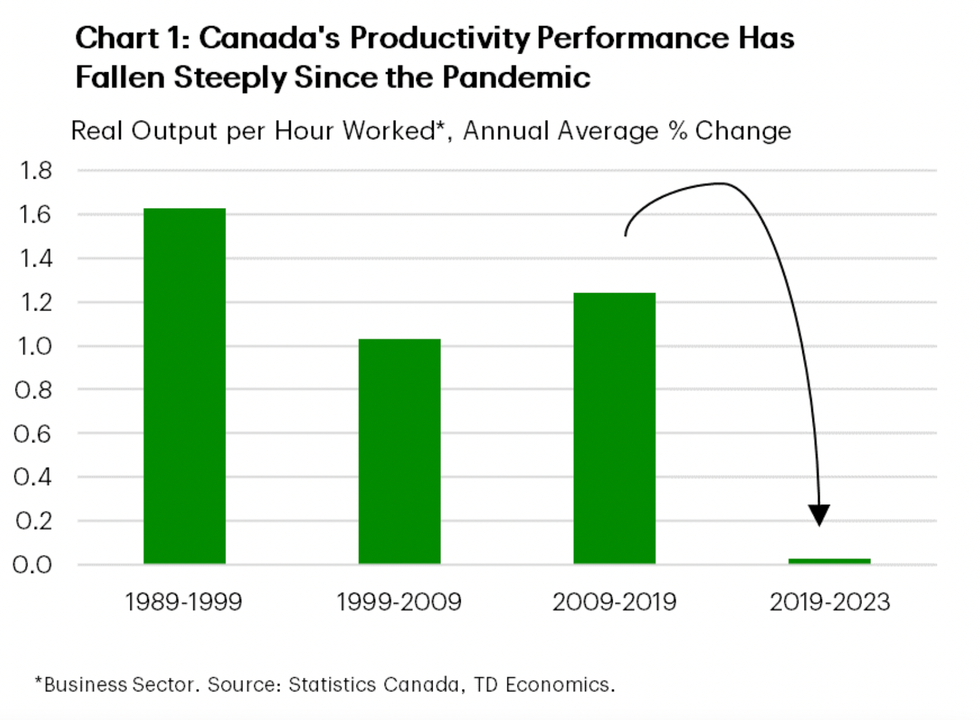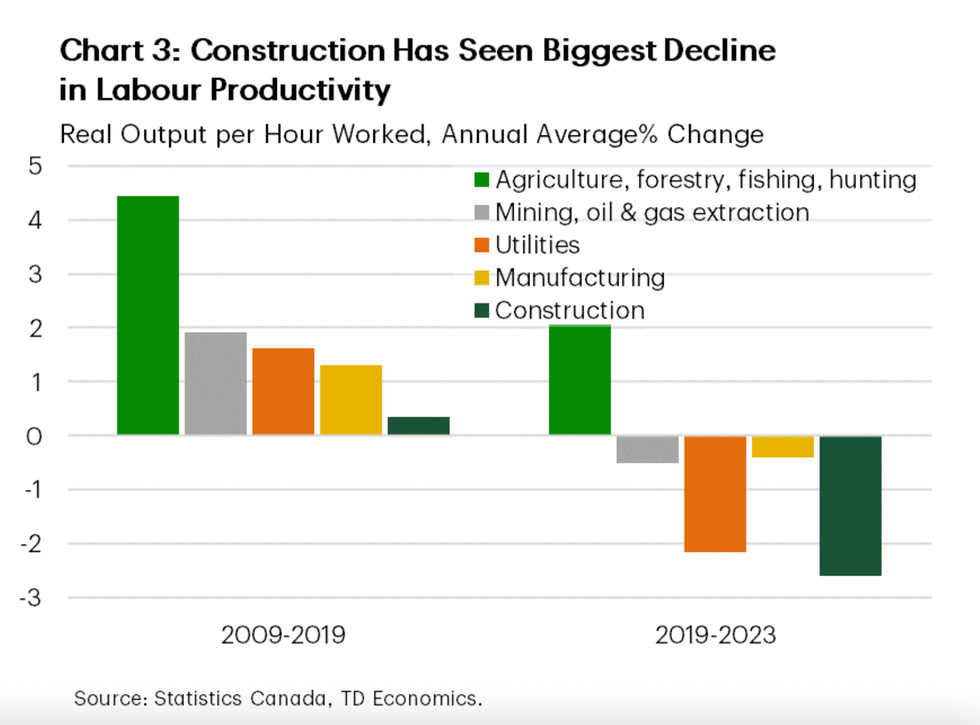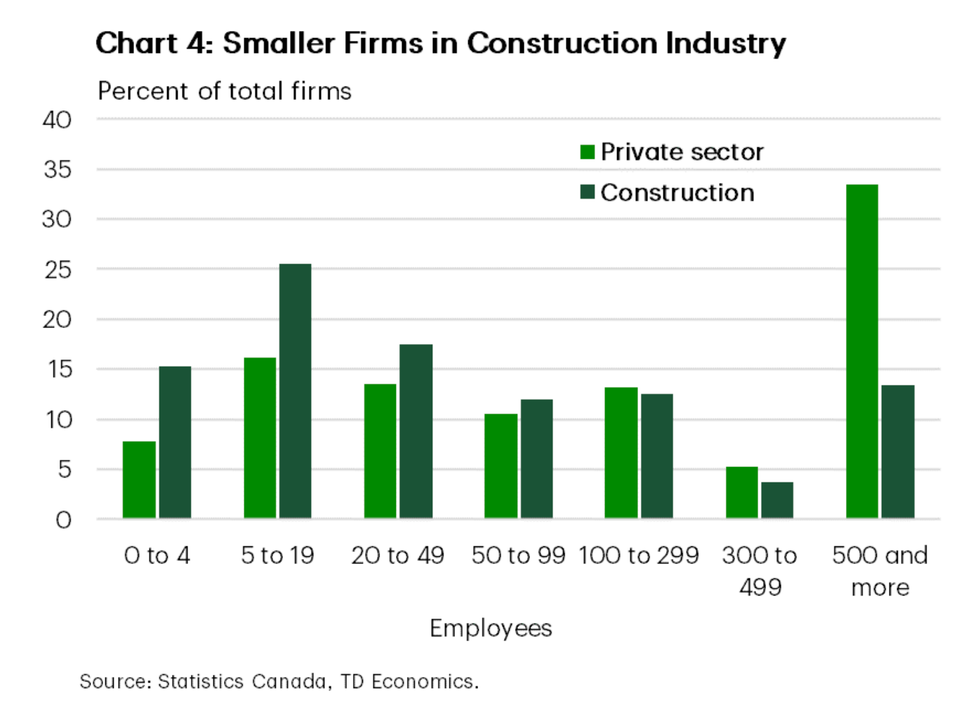Canada has a productivity problem, and according to head economists at TD “there is one sector in Canada that wears the Scarlet Letter more prominently than the others: construction.”
The report, bluntly titled From Bad to Worse: Canada’s Productivity Slowdown is Everyone’s Problem, explores how growth has declined in almost every sector since the pandemic, from manufacturing, to oil and gas, to the service industry. “The woes are widespread,” says the report, but they make it very clear that the construction sector is the main culprit, namely the residential segment.
“Among industries, construction is the worst of the lot with labour productivity at a near 30-year low,” says the report. Unlike other sectors, construction’s productivity decline isn’t just a byproduct of the pandemic — though the fiasco definitely didn’t help matters— it represents a 40-year epoch of stunted growth that has only worsened, “injecting more pain into Canada due to its rising share of economic activity.”
If it’s any consolation, construction productivity is a global problem, the report says, also affecting the US, where productivity only slightly outpaced Canada in the years following the pandemic. Similar to Canada, studies have shown that lagging construction in the US coincides with increasing regulations.
In Canada, the report explains, residential construction productivity varies greatly between different regions, indicating that regulations and permitting play a role in productivity performance. Among other limiting factors are “low-hanging fruit” barriers including building codes, permitting and licensing requirements that differ across provinces, and lack of standardization.
At the same time, of the companies leading Canada’s residential development, many are made up of small firms, with 25% having fewer than 20 employees. And while everyone likes to champion the little guy, it has been shown that “smaller firms have lower levels of productivity and are slower to adopt new technologies than larger firms,” according to the report.
Compounding the issue is the fact that Canada's construction industry is becoming an increasingly larger piece of the puzzle that is the nation's overall productivity, while struggling to produce any growth — sort of like a giant boulder aboard a sinking lifeboat.
Due to its growth in size, the sector now represents 12.6% of all labour hours worked in Canada, as of 2023, while also consuming an increasing amount of resources compared to other areas. As a result, the construction sector was responsible for -0.5 percentage points of annual productivity growth since the pandemic, accounting for "the vast majority of the decline in overall Canadian productivity relative to the pre-pandemic period."
And thanks to the on-going housing and affordability crisis, the sector will only continue to grow in the coming years as the country works to fill a housing deficit of 3.5 million homes, as recommended by the Canada Mortgage and Housing Corporation (CMHC). However, an Economic Viewpoint report from Desjardins found that the Federal Government's forecast of 1 million homes by 2031 via its Canada Housing Plan — already 2.5 million shy of the target — says that even those numbers "are arguably optimistic given regulatory hurdles and constraints on labour, materials, and financing."
So while the sector may grow, productivity still remains an issue.
In their report, Desjardins urged for government reform concerning regulations, financing, and labour supply in order to build much-needed new homes. TD echoed the necessity of these measures, adding that other possible solutions require "outside-the-box thinking." One such solution, they said, could include moving to "prefabricated or modular building, developing a reskilled workforce around it, and rethinking the building code to allow for more flexibility in the sources of materials used that maintain the same results in terms of safety and durability."
Canada's productivity slump is a massive problem that should be "of grave concern to all Canadians," as the report puts it — though one that we have the solutions for. But, if barriers to growth aren't remedied, Canadians, especially those of the younger demographic, could see "a continued drop in living standards, worsening wage stagnation, and a dangerous deterioration in public services."
- Construction Associations Push BC To Create Ministry Of Construction ›
- The Cost Of Toronto’s Current Planning Policy? Millions Of New Homes, Data Shows ›
- Taxes, Fees, And Levies Keep The Cost Of Homebuilding From Adding Up ›
- Edmonton Introduces Automated Reviews For Development Permits ›
- Canadian Housing Starts Dropped 22% In August ›
- Gap Between GTA Population Growth And Housing Stock Hits 50-Year High ›
























